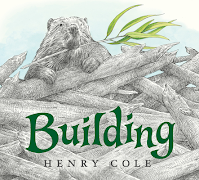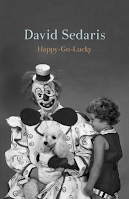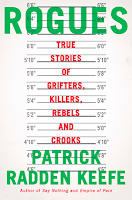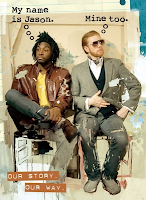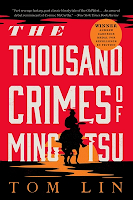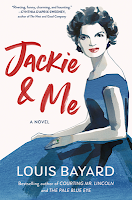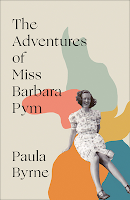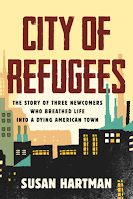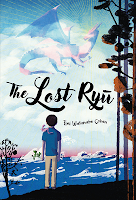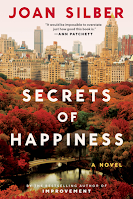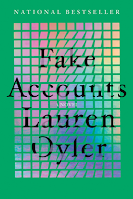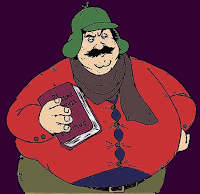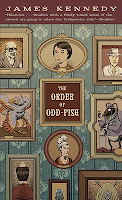Hey book blog readers, thanks for stopping by this week. We got so caught up reading last week that we plum forgot to post out recommendations. Which is a shame, because we read some GREAT books that got their release last week. So we'll include those here with this week's recommendations, and you can simply sit back and reap the rewards of a super bonus double recommendation blog. Sweet!
First, Chris Lee on the latest from Ottessa Mosfegh, Lapvona. Chris says: "Moshfegh is the modern bard of violence and delusion, and Lapvona lies somewhere in the territory between lost books of the Bible and Shakespearian tragedy. In a medieval fiefdom struck by drought and ruled by superstition, a demented power struggle plays out between a bitter shepherd, his deformed but pious son, an ignorant priest, a blind, witchy midwife, and a heretical, frail lord. Is there a wolf among them, or are they all sheep for slaughter? Captivating and brutal, this is a heady novel of ideas that will grab you hard and shake away any scraps of complacency you might have left."
Parker Jensen also has Lapvona on their staff rec shelf. Parker says: "Strange, gross, and utterly compelling, Lapvona is a one-of-a-kind book. As a wise (book review and tracking website own by the company which shall not be named) reviewer once said, "Ottessa, you crazy for this one!"
Next, Parker Jensen also recommends YA novel Never Coming Home by Kate M Williams. Parker says: "Unknown Island is everyone’s dream vacation. It is the most exclusive, all expenses paid, private island getaway, and it will be hosting all of your favorite celebrities. However, you don't choose to go to Unknown Island, Unknown Island chooses you. Or rather, Unknown Island picks 10 carefully curated guests to bring over and enjoy their luxury accommodations. After a lengthy and rigorous viral campaign, everyone is buzzing to find out who the first 10 guests will be. And before long 10 elite influencers make their way to the island, expecting the time of their life. But, they quickly realize things aren't adding up. The accommodations are motel level at best, the marketing team who gathered them is nowhere to be seen, and there is no way off the island. And... they still don't know who exactly owns Unknown Island. Hmm, it seems like the time of their lives might be getting cut a little short. Never Coming Home is an addictive and deadly YA thriller that I couldn't put down. Kate Williams quickly creates a sinister tone, full of black humor and social commentary, that made this so much fun to read. And as soon as the bodies began hitting the floor I couldn't stop turning the pages. Kate Williams has created a devious and campy modern homage to Agatha Christie's classic, And Then There Were None."
And Tim McCarthy has a picture book recommendation - Building, written and illustrated by Henry Cole. Tim says: "I love Henry Cole's illustrations! He uses finely detailed black and white drawings with soft color highlights in just the right places, all to show us the beauty and intricate workings of nature. With a companion picture book called Nesting, he taught us how robins build their nests and raise their hatchlings. This book reveals what beavers do best and how their construction makes a new habitat for many other species. Cole's words are clear and direct. Together, the pictures and the story teach us and also create suspense. Oh, and Building has a young Lego builder's stamp of approval! A six-year-old named Landon liked it and compared the beaver dams to the Mitchell Park Domes he'd just visited!"
Tim also has a few-weeks-past-publication (but why not include it anyway?) write-up for the latest from funnyman and essayist David Sedaris - Happy-Go-Lucky. Tim says: "Once again, David Sedaris lovingly, and with full frontal honesty, embraces the strange ironies of being human: the cold pandemic realities, the oddly positive final days of a tough relationship with his father, America demanding that Black Lives Matter, the fortress of love he’s built with his sisters and with Hugh. The shopping! The best thing about reading Happy-Go-Lucky is that it flows so fast. This is a credit to marvelous writing and storytelling. It's like canoeing a river and immediately knowing you won’t need the paddle. The current carries you, and if you don't run full speed into all the worldly snags and boulders put in your way, then you're just not on the right trip. So enjoy the ride and throw the paddle overboard. That endangered turtle you just cruised past will make better use of it."
Daniel Goldin recommends the latest book from Empire of Pain author Patrick Radden Keefe, which is Rogues: True Stories of Grifters, Killers, Rebels and Crooks. Daniel says: "While I have a subscription to The New Yorker, I don’t read every long-form article. In fact, I consider it a triumph if I can get through the cartoons, 'Talk of the Town,' at least one review, and at least one article. But even when I did read some of the pieces collected in Rogues, I found it fascinating to revisit them as part of a collection. Rogues, particularly if you exclude the closing profile of Anthony Bourdain, reads as a collection of true crime short stories, being that they have the vibrancy of the best fiction. I love the way traditional crime subjects like drug cartels and arms dealers are mixed with the corporate misdeeds of unscrupulous hedge fund managers, look-the-other-way bankers, and unrepentant television producers, leading me to wonder if we should reshelve some of those corporate narrative books that are currently in our business section. Whether you want to read more Patrick Radden Keefe or are just hungering for juicy narrative nonfiction, this should satisfy you 12-fold."
Now we go back to Tim McCarthy for his write-up on the latest from Beautiful Ruins and The Cold Millions author Jess Walter, a story collection entitled The Angel of Rome: And Other Stories. Tim says: "Jess Walter is a very fine writer. The Cold Millions is one of my favorite novels, and with this collection he's delivered again, in style. These contemporary stories are hilarious and clever views of love and pain. They ride life's ironies like bucking broncos while staying on a clear-minded literary path. I felt a kinship with some characters, while others were fascinating strangers, but the sharp conversational tone was always a breath of fresh air. There’s plenty of redemption and even some happy endings. Walter dares to tell us, in writing, that writing can’t hope to capture the depth of living; but his characters have extraordinary dimensions, and they were a whole lot of fun!"
Kay Wosewick has a middle grade book recommendation for us next. Woflstongue by Sam Thompson, illustrated by Anna Tromop. Kay says: "This middle grade book stars Silas, a boy who has trouble speaking when under pressure, and two talking wolves ‘on the run’ from a colony of foxes that enslave wolves. Silas helps wolf Isengrim by removing a sliver from his paw; Isengrim returns the favor after a fox gives Silas a nasty bite on his ankle. Dangerous adventures ensue with Silas, the wolves, and other talking animals, including a crow and a cat who love to taunt each other. Delightful!"
And now back to Tim McCarthy for his words on My Name Is Jason. Mine Too.: Our Story. Our Way. This YA book is a collaboration of Jason Reynolds and Jason Griffin. Tim says: "Two men, one black and one white, college roommates and friends so close that a single "self" has emerged. Their combined talent was clear in Ain't Burned All the Bright, a loving word-picture of family rising through our desperate times; now we get the inside story of how it all came to be. One man graduated from college, the other dropped out to make art, and together they decided New York City could be the place to express their newfound freedom, to struggle and grow together. What I love most is the sense that they're focused on me, on telling their truth to a reader of Jason's poems, a viewer of Jason's art, and a recipient of this hard-won culmination of beauty and success!"
Recently released in paperback editions:
Kay Wosewick recommends Finding the Mother Tree: Discovering the Wisdom of the Forest, by Suzanne Simard: "Two recent best sellers relied heavily on research pioneered by Suzanne Simard: Richard Power’s Overstory and Peter Wohlleben’s Hidden Life of Trees. Simard’s research proved that clear-cut logging old forests causes virtually irreversible damage to the land. But far more importantly, her research discovered why: the trees live as a community, acting for the good of the forest as a whole. This is accomplished via vast underground networks of roots and mycorrhiza that direct nutrients from healthy to needy trees, send warning signals of coming infestations and disease so trees can prepare defenses, and so much more. Clear-cut the trees, the network dies, and replacement trees won’t grow. Simard pursued her research despite belittlement, false criticism, and even sabotage of her research by a powerful clique of men with vested interests in maintaining existing logging practices in British Columbia. But her research proved popular among fellow academics and students, and eventually became mainstream. Growing up in a multi-generation logging family in British Columbia, Suzanne’s insatiable curiosity started her down this forest road when she was just six years old. I spent several enchanted evenings with Suzanne in beautiful British Columbia as she described her pioneering journey. Thank you for your tenacity Suzanne."
And back to Tim McCarthy for his words on The Thousand Crimes of Ming Tsu by Tom Lin: "In some ways it has a classic western feel: the tough towns always primed for violence, death in an instant, or more slowly if water isn't found soon, the clanging of rail spikes as the Union Pacific and the Central Pacific hammer toward their convergence. In other ways it surprises: the 'miracles' revealed by the Ringmaster of a traveling magic show, the wisdom of a prophet with no memory who knows what's on the horizon, the truly amazing quality of the writing. Ming Tsu is a Chinese American orphan, raised by the white killer-for-hire who trained him. "For a long time it had ceased to trouble him to kill." He married a white woman after her father laughed at his proposal and was beaten for it, then convicted of miscegenation and sentenced to work the railroad line. Now he's got scores to settle and a wife to find, even though a judge ruled they were never married. He's wanted, but whites likely wouldn't know he's coming except that he's 'bigger than them Chinese normally is.' Oh, he's coming, and just pray he’s not coming for you! The novel has a mysterious air about the fleeting aspects of memory, what we try to hang on to and what we try to get back. These characters often frightened me and always filled me with wonder. Remarkable!"
See you next week, assuming we don't forget again!


